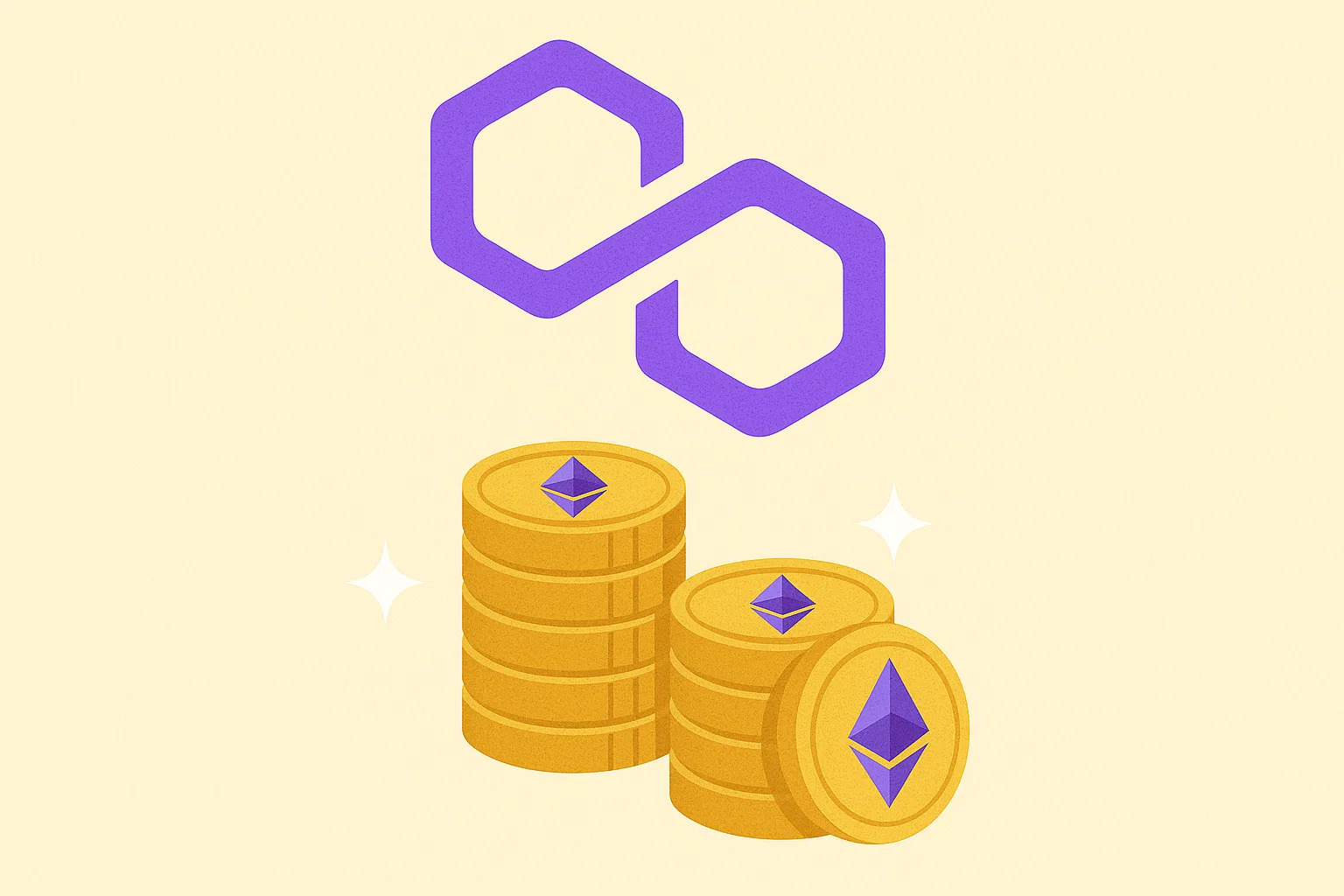Polygon has emerged as one of the most promising players in the blockchain space, especially for those seeking scalable and cost-efficient alternatives to Ethereum. With growing adoption, a range of technical innovations, and partnerships with big-name brands, it’s no surprise investors and developers are paying close attention. But what exactly is Polygon, and more importantly, does it have a future? Is Polygon a good crypto to buy? Let’s explore.
What is Polygon?
Polygon, formerly known as Matic Network, is a Layer 2 scaling solution built to improve Ethereum’s limitations in transaction speed and cost. It operates as a protocol and framework for building and connecting Ethereum-compatible blockchain networks. Its goal is to create a multi-chain Ethereum ecosystem, akin to Polkadot or Cosmos, but with the security and developer familiarity of Ethereum.
Is Polygon a cryptocurrency?

Yes, Polygon is a cryptocurrency. The native token of the network is called MATIC, which serves several purposes:
- Transaction fees on the network
- Staking to help secure the network via Proof-of-Stake (PoS)
- Governance to vote on proposals
MATIC is traded on major exchanges and ranks consistently in the top 25 cryptocurrencies by market capitalization. So while Polygon is primarily a technology platform, the MATIC token is very much a functioning cryptocurrency in its own right.
The Technology Behind Polygon
Polygon is not a single blockchain but rather a scaling framework for Ethereum. It supports various types of chains:
- Sidechains such as the Polygon PoS chain (the most used chain currently)
- ZK-Rollups through projects like zkEVM and Polygon Miden
- Optimistic Rollups (planned for future deployment)
- Standalone and sovereign chains that benefit from Ethereum compatibility
The Polygon PoS chain is currently the most popular component. It processes transactions much faster and cheaper than Ethereum mainnet while still settling on Ethereum for security. It achieves this by running a Proof-of-Stake mechanism that bundles and submits batches of transactions to Ethereum.
The newer zkEVM (zero-knowledge Ethereum Virtual Machine) is a significant milestone. It allows for Ethereum-equivalent computation with the added security and scalability of zk-rollups. This makes it easier for developers to port over Ethereum dApps with minimal friction.
Real-World Use Cases and Partnerships

One of Polygon’s greatest strengths is its adoption across real-world sectors. It’s not just a developer darling; large enterprises and institutions are actively building on it.
Major Partnerships:
- Meta (Facebook) chose Polygon for its digital collectibles rollout on Instagram.
- Reddit used Polygon to power its “Community Points” and NFT avatars.
- Nike and Starbucks have launched Web3 loyalty and collectibles projects on Polygon.
- Stripe integrated Polygon for crypto payouts in its pilot programs.
These integrations show that Polygon is not just an academic exercise but is being used by globally recognized brands to serve millions of users.
Does Polygon Have a Future?
With its active developer ecosystem, consistent technical upgrades, and strategic pivot toward ZK-based scaling, it’s fair to ask: does Polygon have a future?
The answer appears to be yes. The roadmap suggests a strong long-term vision:
- Polygon 2.0: A unified framework for scaling Ethereum via interconnected Layer 2s.
- zkEVM mainnet: Already live and increasingly adopted, offering an advanced solution for Web3 scalability.
- AggLayer: A proposed protocol that aggregates liquidity and user experience across all chains powered by Polygon.
The network has been proactive in adapting to shifting trends in blockchain architecture. Instead of staying locked into its original PoS chain, Polygon is transitioning toward a modular, multi-chain ecosystem.
It’s also worth noting the team’s strong presence in the Ethereum development community. Polygon’s co-founders are regular contributors to open-source tooling and EIPs (Ethereum Improvement Proposals), which suggests long-term alignment with Ethereum’s direction.
Is Polygon a Good Crypto to Buy?

If you’re wondering if Polygon a good crypto to buy, the answer depends on your goals and risk profile. However, there are a few points to consider:
Bullish Indicators:
- Ecosystem Growth: Thousands of dApps and millions of wallets operate on Polygon. It consistently ranks among the top platforms for NFT and DeFi usage.
- Technology Leadership: Its investment in zk-rollups puts it at the forefront of Ethereum scaling innovation.
- Institutional Adoption: Companies like Disney, Adobe, and JPMorgan have shown interest or directly used Polygon.
- Staking Rewards: MATIC holders can stake tokens to earn rewards and support network security.
- Low Fees and High Throughput: This makes it a favorite among developers and users frustrated with Ethereum gas costs.
Risks:
- Layer 2 Competition: Polygon faces strong competition from Arbitrum, Optimism, Base (by Coinbase), and others.
- Token Inflation: MATIC has a fixed supply cap of 10 billion, but not all tokens are in circulation, and release schedules can affect price.
- Regulatory Uncertainty: Like all crypto assets, Polygon could face challenges from evolving global regulations.
If you’re looking for exposure to Ethereum scaling solutions and believe in the long-term future of blockchain interoperability, Polygon may be a strong addition to a diversified portfolio. However, as with all crypto investments, do your own research and consider your risk tolerance.
Polygon Price: Trends and Performance

Polygon’s token typically trades well below its peak of nearly $3, reflecting the broader volatility seen across the crypto market. Despite this decline from historical highs, several factors highlight its ongoing relevance:
- Market capitalization remains in the multibillion-dollar range, suggesting continued investor confidence.
- Daily trading volumes are consistently strong, supporting healthy liquidity.
- Staking participation is significant, with a notable share of the circulating supply locked.
MATIC has demonstrated resilience during market downturns, often rebounding following key ecosystem upgrades. Analysts tend to monitor broad support and resistance zones to assess its momentum, with levels around the half-dollar and dollar marks often considered reference points.
Polygon vs Other Ethereum Scaling Solutions
Polygon operates in a competitive space. So how does it compare?
| Feature | Polygon | Arbitrum | Optimism | Base |
|---|---|---|---|---|
| Tech Model | PoS + zkEVM | Optimistic Rollup | Optimistic Rollup | Optimistic Rollup |
| Fees | Very low | Low | Low | Low |
| EVM Compatibility | Full (PoS + zkEVM) | Full | Full | Full |
| Adoption | High | Growing | Growing | Growing |
| Token | MATIC | ARB | OP | None (uses ETH) |
Polygon’s unique combination of PoS and zkEVM options gives it an edge in flexibility and developer support. While Arbitrum and Optimism lead in Total Value Locked (TVL), Polygon has broader enterprise use cases.
Developer and Community Support
Polygon boasts one of the largest developer ecosystems outside of Ethereum itself. According to Electric Capital’s developer report, Polygon’s developer activity has consistently ranked in the top five for active monthly contributors.
The foundation also offers:
- Grants programs
- Hackathons
- Education initiatives, such as Polygon Academy
The community is active on Discord, Twitter, Reddit, and GitHub, and the Polygon Foundation provides robust support and documentation. This kind of grassroots and institutional support is vital for long-term network growth.
Sustainability and ESG Commitments

Another key area where Polygon stands out is its commitment to sustainability. In 2022, Polygon became carbon neutral and has pledged to go carbon negative. The network has offset over 104,000 tons of greenhouse gas emissions.
This is increasingly important as regulators and investors scrutinize the environmental impact of blockchain technologies. Ethereum’s switch to Proof-of-Stake helped reduce energy consumption dramatically, and Polygon’s PoS and Layer 2 solutions go even further.
In Summary
So, does Polygon have a future?
Yes. Between its technological roadmap, real-world partnerships, growing developer ecosystem, and forward-looking initiatives, Polygon has laid a strong foundation for long-term relevance in the blockchain space. The move toward Polygon 2.0 and the zkEVM rollout are especially promising.
Is Polygon a good crypto to buy?
If you believe in the broader Ethereum ecosystem and the need for Layer 2 scaling, Polygon (MATIC) is one of the top contenders. It is not risk-free, but it offers real utility, institutional adoption, and clear development milestones.
Is Polygon a cryptocurrency?
Absolutely. MATIC is a fully functional cryptocurrency, used for transaction fees, staking, and governance. It is widely traded and integrated into both centralized and decentralized platforms.
What about the Polygon price?
The Polygon price has seen ups and downs, with current levels well below its 2021 peak. Still, the fundamentals remain strong. Long-term investors may see the current price range as a potential opportunity, though short-term volatility is always a risk in crypto.














